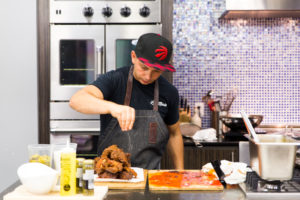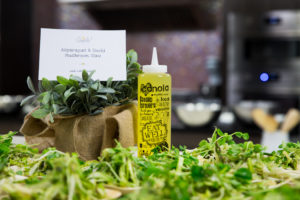As much as we’d like to think we do, Dietitian’s don’t always know everything there is to know about every single different type of food out there, nor do we necessarily know that much about how or where it was made or grown.
That fact was really hit home for me last night when I attended the #CanolaConnect educational culinary workshop series hosted by Canola Eat Well.

I learned more than I expected, not only about the nutritional characteristics of canola oil, but more importantly about the Canadian farmers that produce it. It was both humbling and a real pleasure and privilege to hear real Canadian farmers speak about real farm issues in our country.

I also had the pleasure of witnessing Matt Basile, owner of Toronto hot spot Fidel Gastro’s, do his thing in the Distinctive Appliance’s kitchen and whip together some canola oil fried chicken. He shared with us all the reasons why local restaurant owners like himself opt for canola oil in their establishments, but I won’t spoil that surprise just yet.

It was an eye-opening and educational experience to say the least, and I’m looking forward to sharing the insights with you in today’s article.
Let’s take a closer look at the 5 things that you need to know about Canola Oil:
1. Canola was bred by Canadian scientists from the oil-rich rapeseed (Brassica napus) and the name “Canola” was actually originally trademarked in Canada in 1970. The name canola reflects the fact that the crop is grown in the Canadian prairies and “Can” is meant to represent Canada while “Ola” is meant to represent oil.
2. Canada is one of the top producers of Canola Oil: Not only does Canada happen to be one of the top producers of Canola Oil worldwide and the oil you find in your grocery store is produced right here in the Canadian prairies, which is something that I certainly did not know. One of the biggest draws of Canola oil is that it truly is the local choice, which is something I appreciate SO much more after speaking to real Canadian farmers at the event.
3. Canola is related to well-known vegetable varieties of the Brassica family, which also includes turnip, cabbage and Brussel sprouts. I personally found this fascinating, having not really known much at all about the origins of canola oil.
4. Canola oil has a very high smoke point (460F) and one of the highest smoke points among conventionally available oils. This is one of the things that chefs like Matt absolutely love about it. Canola’s high smoke point means that it is safe for cooking foods at higher temperatures, which is what made it a smart choice for Matt Basile’s fried chicken recipe at the event.
5. Canola has a very good “fat profile”: Much like olive oil, canola oil has a very high monounsaturated fat content and a very low saturated fat content, giving it an ideal profile for cardiovascular health and meaning it can certainly help contribute to reducing ad (LDL) cholesterol levels when used in place of saturated fat rich alternatives like butter. Canola oil also contains plant phytosterols, which play a small role in helping your body clear cholesterol. As an added perk, 10% of its fat content also happens to come from omega-3 fatty acids!

So I’m willing to bet you’ve learned a whole bunch of new stuff about Canola Oil by this point.
One of the other really novel things that I like about it is the fact that, for a healthy vegetable oil, its price per litre is relatively low compared to some of the other conventional options.
Obviously, economical considerations are important and it is even more important for Canadian consumers to understand that canola oil is not only affordable but also a locally sourced and healthy option for themselves and their families.
If you’ve never cooked with it, you can do no wrong by giving it a shot. It has a light and neutral flavour that is heavily influenced by the herbs and spices it is accompanied with.
Final Thoughts
At the end of the day, the event allowed me the opportunity to learn a whole lot about a food that I honestly didn’t know much about before and to come to terms with the fact that my kitchen does not need to be an “oil monopoly”.
I encourage you guys to try new things, canola included, and be proud of putting your faith in Canadian grown food!
Until next time,
Andy De Santis RD MPH

Group Photo at The Event
Photography by Josh Tenn-Yuk (@joshteewhy) courtesy of Canola Eat Well.



